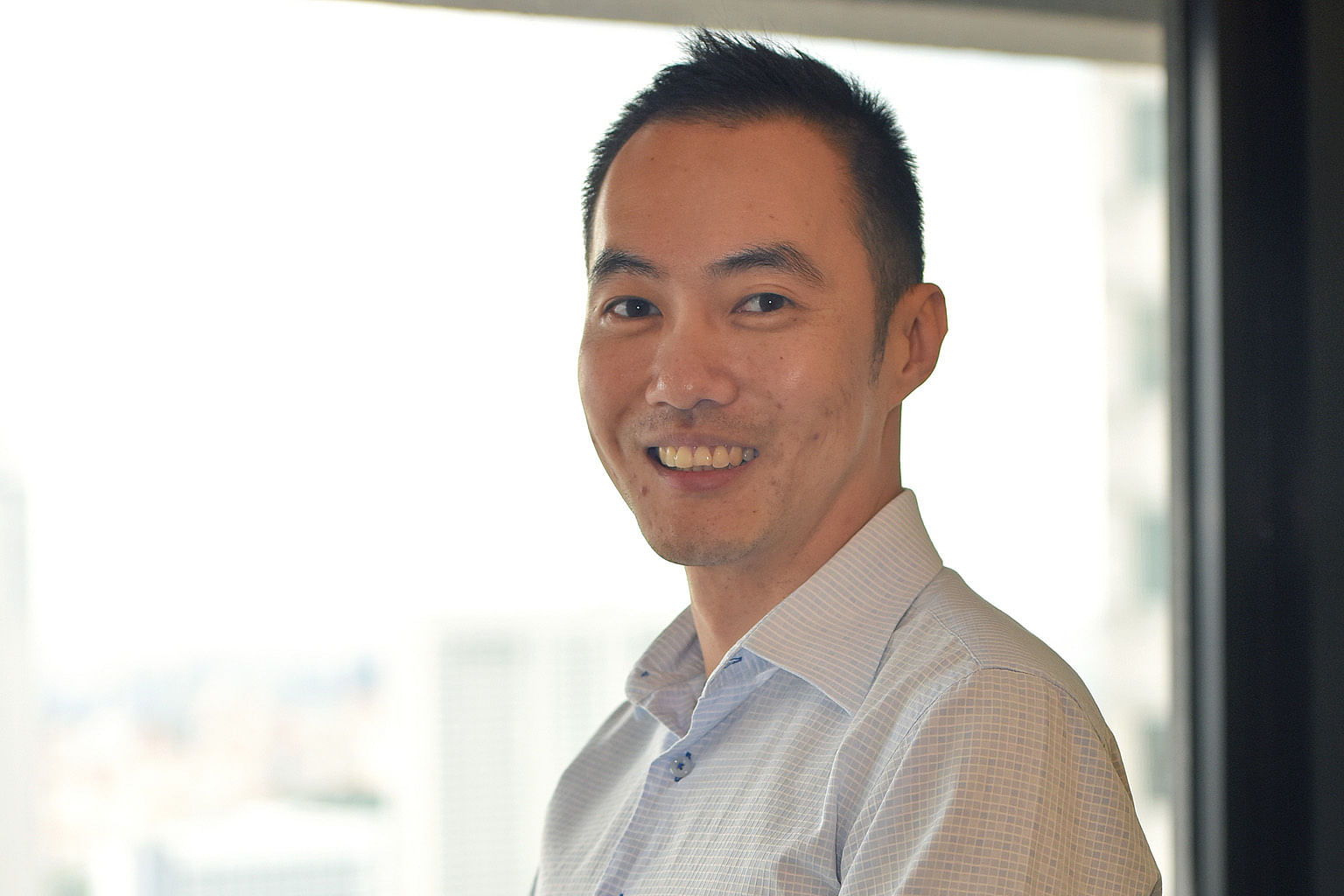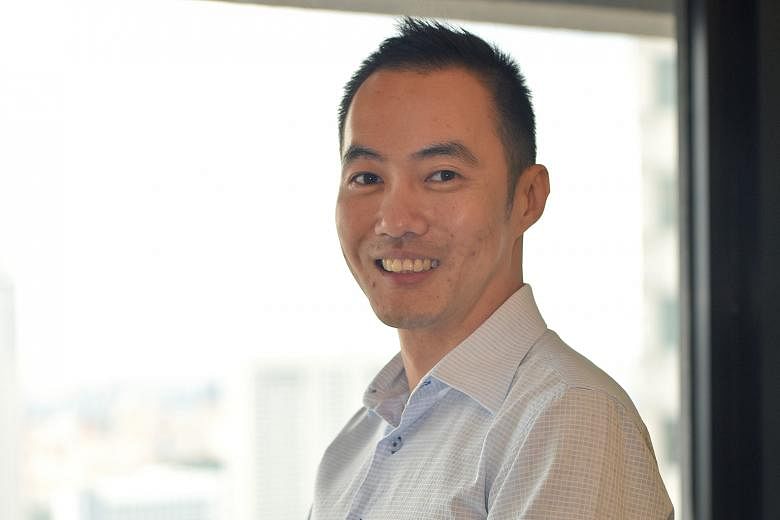Learning about different asset classes as he watched his father invest not only fascinated Mr Lester Chan as a child, but ultimately shaped his career.
Mr Chan, chief executive of Fund Singapore, an equity and lending-based securities crowdfunding firm, says: "I decided if I wanted to be a good investor, I needed more than just luck or trying to time the market. Knowledge and experience was essential so I joined the banking sector after graduation."
Even though Mr Chan, 37, studied mechanical engineering, business and investing was always on his mind, leading him to minor in technopreneurship.
Despite being a top performer in banking, he left the finance sector in 2008 and set up investment and consulting firm BeaconRock Group - now known as BeaconRock Investments - a year later. He put in about $500,000 from his own savings for the capital.
He, later, took up a scholarship to pursue an MBA from Singapore Management University (SMU) in 2012.
Mr Chan says: "After working for several years, I felt I had enough corporate experience and maturity to appreciate the course, and wanted to master the hard and soft skills of business."

SMU still plays a major role in his life today, as he is also an adjunct teaching faculty member at its Lee Kong Chian School of Business, for the Master of Science in Innovation programme.
"When it comes to innovation, I always tell my students: You either let others disrupt you, or you disrupt yourself first. In the crowdfunding space, I discovered segments not met by private equity or venture capital."
-
Worst and best bets
-
Q What has been your biggest investing mistake?
A I should have cut my losses and exited the markets earlier during the financial crisis in 2007.
I was invested in equities in Hong Kong and Singapore and mutual funds and saw the crash. As the crisis worsened, my willingness to cut my losses fell too. I thought since I'd already lost so much, it wouldn't hurt to hold on.
That was a big mistake. By mid-2008, my portfolio fell to half of its pre-crisis value. It was a near six-digit figure loss and a painful experience but part of the maturing process as an investor.
Q And the best investment move?
A Pursing my MBA in 2012, something I've wanted to do since my undergraduate days.
I consider it my best investment because despite taking a year off work for it, the returns were huge. I gained much knowledge and wisdom from the faculty and my peers. I was constantly challenged and formed great friendships.
I had so much fun and was in my element, even making it to the dean's list. I now serve as the president of the MBA entrepreneurship society and my vision is to groom and fund aspiring entrepreneurs and start-ups.
Rachael Boon
This inspired him to start Fund Singapore last year, a business that he is now focused on, while his partners run BeaconRock Investments.
Mr Chan says: "I'm also involved in start-up competitions every year and the idea was to use local money to help support local companies.
"The team has strong expertise in the private equity segment and in venture capital, as well as ex-investment bankers on board. Using our collective skills, we can find value companies to invest in, and for the public to invest along with us."
Q Moneywise, what were your growing-up years like?
A My dad was the sole breadwinner, doing sales in the diamond industry. When the recession hit in the 1980s, we were affected. As the youngest in the family - I've two elder brothers - I had few new toys or school books and used hand-me-downs. We'd also buy slightly larger uniforms so we didn't outgrow them as fast.
I also recalled my parents walking several kilometres instead of taking public transport to save money. Despite tough times, my dad would remind us to help others whenever we could and would still donate to charities.
Things started to turn around in the early 1990s but the value of being thrifty remained.
Q How did you get interested in investing?
A My dad used to invest actively in the stock market. It was the small returns that helped us through the recession in the 1980s. Being in the diamond industry, he'd also expose us to other asset classes such as precious metals and stones.
Dinner conversations usually centred around stocks and investments. My dad would monitor stock prices on Teletext and I'd watch the counters move too.
Q Describe your investing strategy.
A I invest and hold for the mid (one to two years) to long term, which is two to four years, and there must always be a clear exit strategy.
Things I look out for include whether the firm has the cash flow to repay debts and such, or potential cash flow as well.
The management also has to be capable enough to pull off its business plans. As with most investments, the risk comes from execution. I also look at possible avenues of recourse such as collateral.
Q What's in your portfolio?
A I make all my investments through BeaconRock and Fund Singapore. As a crowdfunding firm, Fund Singapore commits to co-investing in all campaigns to have our skin in the game, and commits to fund Singapore's start-ups and companies.
The paid-up capital for Fund Singapore - where I'm the majority shareholder - was $1 million.
The investment portfolio of Fund Singapore will change according to the market environment, and the targeted mix is 15 per cent in start-ups, 60 per cent in bigger firms and 25 per cent in real estate projects. We expect a yield of about 12 to 15 per cent a year.
I previously bought a condo unit in Telok Kurau in 2008 for less than $800,000 and sold it for a 20 per cent profit in 2010.
Q What does money mean to you?
A It's a means to an end. To attain my dreams and goals, I need money, but it's never an end by itself. Family, good friends, health and happiness are more important.
Q What's the most extravagant thing you have done?
A I love my single malt whiskies. I took time off twice last year to travel to Japan just for whiskies. The age-statement Japanese whiskies and scotches can cost a few thousand dollars a bottle. That's my one guilty indulgence..
Q What are your immediate investment plans?
A Given the current uncertainties in the market, I'm more cautious. I'll continue to invest in Fund Singapore and use it to look for good companies with strong fundamentals.
I see great value in some local firms that are under-priced by the capital markets. We're in the process of reviewing them.
I plan to grow and strengthen the Singapore operations for Fund Singapore, as well as to expand in the region next year. It will require capital of $10 million to $12 million.
Q How are you planning for retirement?
A I don't plan to retire but my dream is to own a few houses in different parts of Asia. I love what I'm doing in business and will do that for as long as possible.
Q Home is now...
A A four-bedroom apartment in the central region with my wife, six-year-old daughter and son, who is three. It was important to secure a home. Even if I lose everything, we still have a roof over our heads.
Q I drive...
A A Honda but love vintage cars like Rolls-Royces. I take public transport to work to avoid traffic jams.


